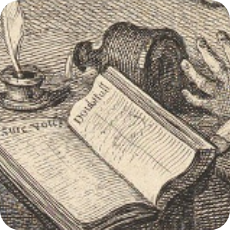July
1826
northumberland
Contested
GENERAL ELECTION
Poll book data from:
Citation: The poll-book of the contested election… (Alnwick: W. Davison, 1827)
Source: John Sims (ed.), A Handlist of British Parliamentary Poll Books (Leicester, 1984); Jeremy Gibson and Colin Rogers (eds.), Poll Books, 1696–1872: A Directory of Holdings in Great Britain (4th edn., Bury, 2008); L. W. L. Edwards (ed.), Catalogue of Directories and Poll Books in the Possession of the Society of Genealogists (4th edn., 1984).
Timeline & Key Statistics
Contexts & Remarks
Dates: Tuesday 20 June-Thursday 6 July 1826.
Poll book reference: The poll-book of the contested election... (Alnwick: W. Davison, 1827).
The first 311 pages of this volume are composed of the various papers, addresses, songs, and other printed election literature produced during the contest.
Candidates: Hon. Henry Thomas Liddell (Canningite Tory), Matthew Bell (Tory), Thomas Wentworth Beaumont (Independent), and Henry Grey, Lord Howick (Whig).
Hon. Henry Thomas Liddell was the son the 1st Baron Ravensworth, a coal owner and favourite at the court of George IV. Liddell had unsuccessfully run during the by-election against Matthew Bell earlier that year.
Thomas Beaumont campaigned on parliamentary reform, Catholic emancipation, and the abolition of slavery. He was seen as 'an eloquent supporter of government'.
Matthew, 'Honest Matty' Bell of Woolsington was a returning candidate, having been elected earlier that year. Bell was one of the 'Great Northern coal owners', serving as sheriff for Northumberland from 1816 to 1817, and nephew of a former Knight of the Shire for Northumberland. His campaign raised the cry of 'No Popery', running as an anti-Catholic candidate.
Lord Howick was the son of Lord Grey, a leading Whig.
Liddell led in the polls early on, leading Lord Howick to accuse Liddell of bribery. Beaumont intervened to say that this accusation was repeated by Mr Lambton (who sought to protect Mr Bell's interest in the electoral race), but ultimately led to a duel between Beaumont and Lambton on Bamburgh Sands. Neither was injured. Lord Howick trailed in the polls from the outset, but by 3 July withdrew from the race when it was clear his campaign was unsuccessful.
Both Liddell and Bell were elected on 6 July, an election which cost £90,000 and £60,000 respectively. Ultimately, they had to pay £30,000 each for their election expenses, while Beaumont had to pay over £40,000. Meanwhile, Lord Grey sold Ulgham Grange to finance the 1826 by-election and general election for his son. Lord Grey estimated that the overall cost of the election for the county of Northumberland was £187,681.
Cultural Artefacts
Poll Book
Below is a digitised version of the poll book for this election:






